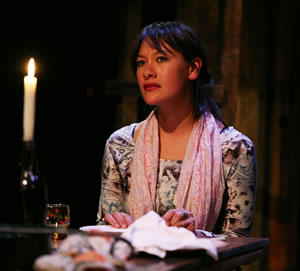Savage River| Griffin Theatre/MTC/TTC
- June 20th, 2009
- Posted in Reviews & Responses
- Write comment

When lights dim and the performance starts there is clicking of black riverbed stones as boots march and grubby feet scamper. As the light grows through slotted timber frame-worked shack we meet Kingsley (Ian Bliss) and Tiger (Travis Cardona), living a Spartan-like existence by a river since the departure of Tiger’s mother sometime ago. Set in the wilderness of Western Tasmania, Savage River speaks of a life beyond the reach of many: a world which is simple: where cooking fish with shallots is, according to Kingsley “over complicating things. If you are going to eat a fish, in my book, just eat the fish.” Life is back to basics: shelter, food, water, companionship. Basic and secluded, where you can get all you need from the river father and son live on mussels, mutton birds and the occasional dagwood dog.
Written by Steve Rodgers and directed by Peter Evans, Savage River is a co-production with Melbourne Theatre Company and Tasmanian Theatre Company, developed with assistance of Play Writing Australia’s National Play Festival (2008) and is premiering at the SBW Stables Theatre via Griffin Theatre Company’s Season: with this level of support and interest, Savage River is one of the most anticipated new plays of the year.
Unusual in time and space, this two act play which stretches beyond the confines of the comfortable 75 minute structure to approximately two and a half hours with an interval. It also ventures beyond the urban and suburban realties of Australian life, beyond rural, to the remote: where you can get lost or be lost. It is there that we watch the story unfold : father and son in the secluded Tasmanian forest are joined by a stranger, Jude (Peta Sergeant) whom Kingsley brings home after rescuing her from a crowd of “a dozen men hungry to go through her.” Before too long, Jude is immersed in the world of Tiger and Kingsley, and transformations appear in Tiger, in Jude. Largely this play about emancipation: how education through art: music (Nellie Melba) literature (romance novels) and performance (The Three Stooges) can facilitate escape – imaginatively and physically. It is also about growing up and away from all that you have been told and taught to value, in order to discover an alternative.
Peppered with charming and endearing moments, this production explores the dynamic between older woman/young man, father/son, woman/man, visitor/host, local/outsider, victim/perpetrator, mother/son, rich/poor. It is these dichotomies in which the tension of the play develops: as we watch the power shift and change as more is revealed about Jude, Kingsley and Tiger’s past. As the play unfolds, we begin to understand that all three are bound to each other, to obligation, to place: all are limited by something, all trapped: by debt, by location, by ancestry, by love lost and loyalty.
With an impressive design Stephen Curtis complimented by “sublime” lighting design by Daniel Zika, this is a beautiful looking production. With a strong cast Ian Bliss evenly balances yearning with menace, whilst Travis Cardona solidly presents obedience paired with curiosity (although I’m not sure that as a character who is seventeen and illiterate necessarily strips the character of young adult qualities). However, the must-see performance is that of Peta Sergeant’s Jude: an authentic and embodied stranger in a strange land: spectacular in her nuanced and honest portrayal.
Peter Evans’ production is one of well-paced scenes and authentic dialogue exchanges between desperate people trapped by their circumstances: which are both self imposed and beyond their control. However, in this case, the story is not as enthralling as the relationship study presented. The mystery surrounding Tiger’s mother, is barely a mystery, Kingsley’s motives are transparent, and Tiger is more “mouse” than teenage “man”. We are held by tension of guessing “when” and “how” action will take place, not “what” will take place – as it is presented upfront a well-foregone conclusion. This is not an overly complicated nor sophisticated story: it is a simple story featuring characters at their most simple (not in a pejorative sense) and need at its most basic.